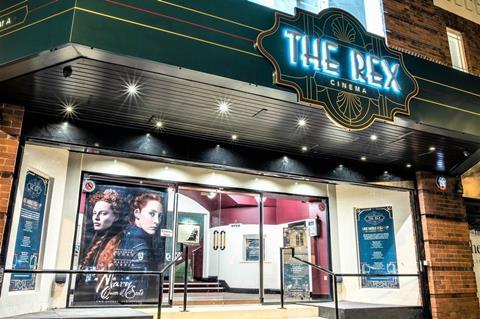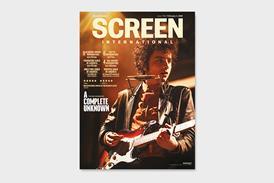
”Wherever there is a Gail’s bakery, or a The White Company, that’s where I want to put a cinema,” says Tony Mundin, managing director of burgeoning boutique UK cinema chain Manero Cinemas.
Manero Cinemas has just acquired its sixth site, the Nothern Light cinema in Sale, Greater Manchester, in the north west England.
“Sale was very attractive,” says Mundin. “Sale hasn’t had a cinema for a very long time. That’s 50,000 people, no cinema. Sale, like all towns, has its challenges, but it skews affluent, and Greater Manchester is absolutely buzzing.”
The Northern Light is taking over a building currently operated by retailer WH Smith. It is part of a regeneration of the area spearheaded by property developers Altered/Space, which will be the cinema’s landlord.
The three-screen venue will showcase studio, independent, foreign-language and classic films plus event cinema releases, and is positioning itself as an “affordable luxury” venue, with the average Manero cinema ticket price at £9.81.
Manero Cinemas is a family-run business. Mundin, who formerly owned a company supplying high-end retailers with packaging, opened his first cinema in partnership with his wife in 2006. Venues are situated around the Midlands and the north of England, with sites in Wilmslow, Heaton Moor, Melton Mowbray, Belper and Wirksworth.
“The bigger the car park, the bigger the cinema’s problem”
The UK exhibition sector has struggled in the wake of soaring operational costs, Covid interruptions, changing audience habits and supply issues after last year’s Hollywood strikes. Picturehouse has announced closures, and parent company Cineworld is reportedly planning to axe up to a quarter of its UK cinema estate.
“It’s tough, there’s no doubt about that,” Mundin admits. “But the main reason it’s tough is because everyone is struggling for content. I can prove the cinema model is not broken because when we have the right content, we can’t get you a ticket, it’s full. Inside Out 2 is about to be in one of the top 10 biggest films of all time.
“But what we normally have is a run of films we can show every week, and we’ve not been able to do that. That’s a knock-on from Covid, and the strikes last year have left a hole. We’re in that hole now – but if you look at the second half of this year, it looks great.”
Outside of studio fare, Mundin has found films that skew towards an older audience have been most successful, such as Wicked Little Letters. “We programmed that for 15 shows at one of our sites, and over those 15 shows, we dropped five seats. That’s phenomenal. Give us The King’s Speech, three times a year, that kind of film.”
“There is a further significant problem,” he continued, “and that is communication from cinemas and distributors about what is on. Ostensibly the marketing budgets from the studios hasn’t changed, but what they’re getting for that marketing money is a lot less. TV advertising costs three times what it used to be, it’s the same across all the media outlets.”

However, ‘luxe’ boutique offerings, such as Everyman, indicate some positive greenshoots for UK exhibition. At the end of 2023 the chain took over former Tivoli cinemas in Bath and Cheltenham, with further venues set to open in London’s Stratford Cross and Lichfield this winter. Manero Cinemas is also looking to expand, but will do so cautiously.
“We’re a small business, our overheads outside of our cinemas are unusually low,” said Mundin. ”We don’t have a head office, we don’t have corporate structure, it’s very much a family business. We are cinemagoers ourselves. We firmly believe this business is only about one thing, and that is the audience.”
He continues, ”We are self-financing – we’re trying wherever we can not to borrow money to do that, so we will use all of our reserves to build Sale. We will then need a period of time to recover to do the next one. What that gives us is a very sure footing. For our ticket price and our overheads, we’re not paying off huge debt, which is what’s caused problems for the likes of Cineworld. We’re a fairly safe bet, but we’re quite conservative in the way we approach things.
“We won’t stop at six – we’ll keep going. What we’re looking for, what we think people want now, are smaller auditoriums, smaller sites, good service, and a bit more intimate. Nice drinks, nice seats, nice people, and that’s what we’re trying to offer. The bigger the car park, the bigger the problem the cinema’s got.”
Mundin is not ruling out moving into inner city sites, however he admits, “It’s a harder pull. Sale isn’t cheap, but it’s a reasonable rent that will allow us to make some money.”
The reason a Gail’s bakery is significant is the demographic it represents. ”You look at what else is in the town, what the retailers and the restaurants are doing,” says Mundin.
He has some concerns about possible impacts on the exhibition sector from proposed initiatives by the Labour government, such as what the scrapping of the inheritance tax relief for family businesses could mean for the Manero chain’s future, as well as the government’s plans to crack down on zero hours contracts, as outlined today in the King’s Speech.
“The bulk of our staff are employed on zero-hour contracts, and it really suits them,” he explains, with much of the cinema front-of-house team made up of school and university students.
“The Fall Guy, Planet Of The Apes and The Quiet Place [Day One] were bankers as far as I was concerned. They’ve all underperformed. If I’m booking my staff in advance with those three films, I would massively have overstaffed it. Looking at how they’ve done, we’re able to react,” said Mundin. ”The flip side of that is Inside Out [2] has gone absolutely nuts, so we’re drafting staff in as quickly as we possibly can.”















!["Within two weeks [of moving to Northern Ireland] I met Kneecap, the biggest caners in Belfast," says Peppiatt](https://d1nslcd7m2225b.cloudfront.net/Pictures/274x183/5/3/9/1442539_kneecap1creditpeadarogoill_298103.jpg)





!["Within two weeks [of moving to Northern Ireland] I met Kneecap, the biggest caners in Belfast," says Peppiatt](https://d1nslcd7m2225b.cloudfront.net/Pictures/100x67/5/3/9/1442539_kneecap1creditpeadarogoill_298103.jpg)


No comments yet